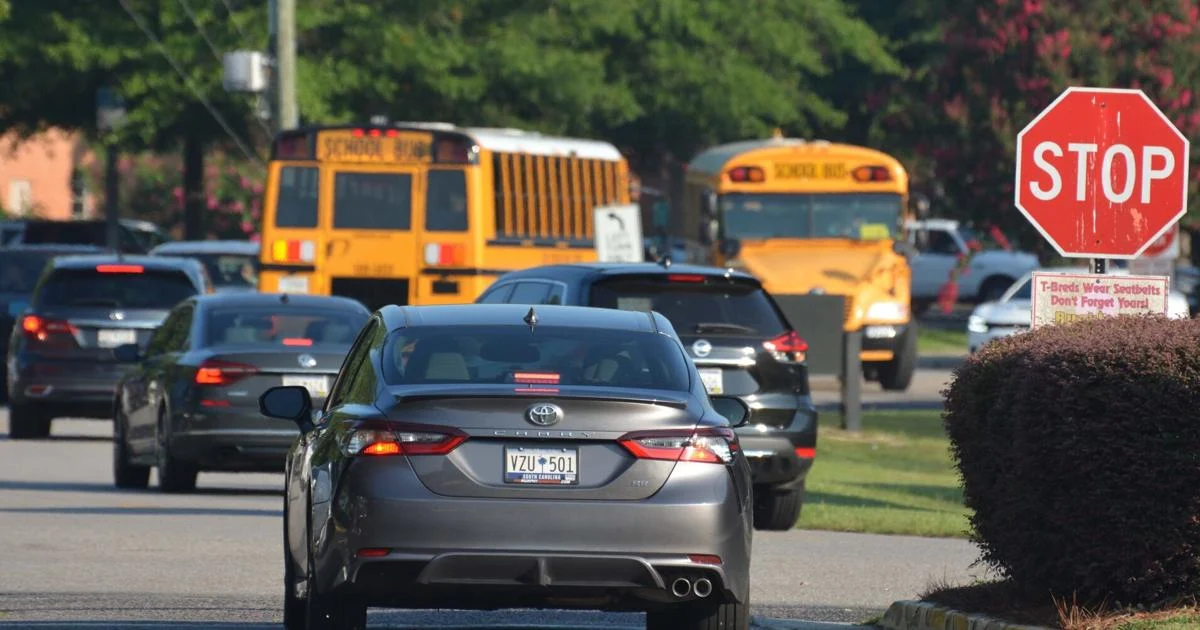
Reform school site standards
Twenty years ago, then-Gov. Mark Sanford tried to make South Carolina’s public schools more walkable. At the time, state guidelines required enormous school sites (sometimes 20 or more acres) to fit multiple driveways, turning loops and parking lots. That pushed many new campuses far from neighborhoods, forcing families to rely on long bus rides and endless car lines.
In 2003, Sanford got the minimum acreage rule eliminated, giving districts flexibility to build smaller, in-town schools. But the state Department of Transportation never changed its own access standards. DOT still requires separate entrances for buses and cars (unless otherwise approved by the agency), long stacking lanes and at least 600 feet of separation between driveways. These rules make compact, neighborhood-scale schools nearly impossible, even when districts want them.
The result is a quiet, 20-year stalemate: Education policy allows walkable schools, but transportation policy largely blocks them. Most of South Carolina’s newer schools are still built on the outskirts, surrounded by parking lots and highway turn lanes, a model that locks children and parents into car dependency and lengthens commutes for everyone.
If we truly care about efficient government and safe, connected communities, the next reform must come from the Transportation Department. Updating its school access rules to permit smaller sites, shared loops and better pedestrian access would finally fulfill the intent of Sanford’s 2003 reforms. South Carolina shouldn’t need another generation to finish a job we started two decades ago.
DANIEL CASE
Spartanburg
Curbside check-in helpful
I commend the Charleston County Aviation Authority and multiple airlines for supporting the new curbside check-in service, CHS Check n’ Go, at Charleston International Airport. Many airports do not offer this service, but it’s a helpful convenience and makes check-ins for people with handicaps and the elderly less arduous.
I recently helped my handicapped sister get to the airport and checked in for a flight home. Seeing those friendly employees at the outside counter was such a relief. I had envisioned the struggle of getting her checked in, needing to leave my car unattended at the curb to assist her and her luggage, and arrange wheelchair support.
The curbside check-in made it all a breeze — no wrangling with luggage, no waiting in line at the counter and no struggling with the computer check-in. Instead, some helpful and friendly attendants took care of everything.
I thank the airlines that support curbside check-in, as well as the Aviation Authority and the staff who handle curbside check-ins with the friendliest and most helpful Charleston touch.
GABRIELLE CAUSBY
Yemassee
Veteran care access
The Post and Courier recently noted that U.S. Department of Veterans Affairs hospitals are remaining open during the federal government shutdown. That’s reassuring, but it misses the bigger issue veterans face every day: access to timely care.
As a veteran’s spouse and advocate, I speak daily with veterans in my community who struggle to get appointments when they need them. The shutdown adds another layer of fear — reminding veterans how easily politics can interfere with their health. No one who wore the uniform should ever have to worry that bureaucratic gridlock could keep them from receiving life-saving treatment.
That’s why the Veterans’ ACCESS Act of 2025, a bill now before Congress, is so important. It would strengthen community care access standards, ensuring veterans can use their earned benefits to see local doctors when the VA can’t provide care quickly enough or at a nearby location.
Congress has important work to do. South Carolina veterans deserve more than assurances that VA doors are open. They deserve the freedom to access timely, high-quality care in their own communities.